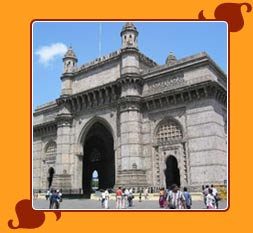One of the most prized possessions of the country,
the
Gateway of India is situated on the waterfront in South Mumbai. Anyone
coming to Mumbai from this harbor is greeted by the huge monument, which
stands as a testimony to the imperial bygone era of the city. As you pass
through the gate from the city side, the first scene that looms into view is
that of the waterfront of South Mumbai. A popular harbor, it is used by a
large number of people for traveling to the other parts of Bombay,
especially the Elephanta Island.

The
architecture of
the Gateway of India comprises of a huge arch, which
is approximately 26 m in height. The entire structure has been made by using
yellow basalt and reinforced concrete. It has mainly been constructed as per
the Indo-Saracenic style of architecture. One can also find the features of
the Muslim architectural styles that were very much popular in Gujarat in
the 16th century. The top of the monument stands adorned with a central
dome, which has a diameter of 15 m.
The construction of the
Gateway of India led to the displacement of the harbor and it had to be
completely realigned. The monument was constructed in the early 20th
century, at the astronomical price of 21 lakh rupees. The major burden of
the cost was undertaken by the Government of India. However, even the 21
lakh rupees could not prove sufficient and the idea of constructing an
approach road from the monument had to be discarded. The construction work
of Gateway of India was undertaken by Gammon India Limited, established by J
C Gammon.
HistoryThe main idea behind the
construction of the Gateway of India was to celebrate the visit of King
George V and Queen Mary to Bombay. Sir George Sydenham Clarke, the then
Governor of Bombay, laid down the foundation stone of the monument in March
1911. However, his plan was approved in 1914 and the reclamations at Apollo
Bundar got completed in 1919. Designed by George Wittet, an architect,
Gateway of India took approximately 4 years (1920 to 1924) to get fully
completed.
Attraction of Gateway of India The
Grand and Magnificent Landmark Of Mumbai Mumbai's principal landmark, the
Gateway of India is a huge archway on the water's edge at Apollo Bunder. It
is the starting point for most tourists who want to explore the city. This
famous monument was built to commemorate the visit of the first ever British
Monarch, King George V and Queen Mary in 1911.
The Gateway was
built by the British and designed by the architect George Wittet. The first
stone was laid by the then Governor of Bombay on March 31st, 1913. The Gate
was formally opened in 1924. It is 26m high structures, complete with four
turrets and intricate latticework carved into the yellow basalt stone.
Ironically, when the British Raj ended in 1947, this colonial symbol also
became a sort of epitaph: the last of the British ships that set sail for
England left from the Gateway. Behind the arch, there are steps leading down
to the water.
Here, one can get onto one of the bobbing little
motor launches, for a short cruise through Mumbai's splendid natural
harbour. One can buy tickets for a short cruise on the motor launches from
here. Near the Gateway of India is Taj Mahal Hotel, one of the most famous
and luxurious hotels in India. Close by are the statues of the Maratha
leader Shivaji astride his horse and of Swami Vivekananda, that add to the
charm of this monument






 The
architecture of the Gateway of India comprises of a huge arch, which
is approximately 26 m in height. The entire structure has been made by using
yellow basalt and reinforced concrete. It has mainly been constructed as per
the Indo-Saracenic style of architecture. One can also find the features of
the Muslim architectural styles that were very much popular in Gujarat in
the 16th century. The top of the monument stands adorned with a central
dome, which has a diameter of 15 m.
The
architecture of the Gateway of India comprises of a huge arch, which
is approximately 26 m in height. The entire structure has been made by using
yellow basalt and reinforced concrete. It has mainly been constructed as per
the Indo-Saracenic style of architecture. One can also find the features of
the Muslim architectural styles that were very much popular in Gujarat in
the 16th century. The top of the monument stands adorned with a central
dome, which has a diameter of 15 m.